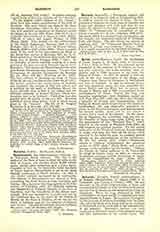

Barrande, JOACHIM, French palaeontologist, b. at Sangues (Haute-Loire), August 11, 1799; d. at Frohsdorff, near Vienna, October 5, 1883. He was educated at the Ecole Polytechnique in Paris and was selected by Charles X to be the tutor of his grandson, the Duc de Bordeaux, also known as the Count de Chambord. When the king abdicated in 1830 he accompanied the royal family to England and Scotland and finally to Prague. He continued throughout his life on terms of intimate friendship with the duke, who, after the death of the king, took up his residence at Frohsdorff, and he acted also as the administrator of his property. Barrande’s interest was early awakened in the fossil remains of his adopted country and their distribution in the various strata. The field was a new one for until the date of his first publication scarcely any attention had been paid to stratigraphical geology and paheontology in Bohemia. During the summers of 1840-50 he made preliminary surveys on foot of the Silurian district, an area of about 140 sq. miles. This was the beginning of his extensive investigations on the Silurian system of Bohemia. Quarries were opened and workmen engaged to search for fossils, and for forty-three years he devoted his time and resources to the vast undertaking and especially to describing, naming, and figuring the numerous specimens which were discovered. The results of his labors are contained in his great work—”Systeme silurien du center de la Boheme—which stands almost unrivalled in palmontological literature” (von Zittel). The first volume was published in 1852 and at the time of his death twenty-two large quarto volumes with 1160 plates had appeared. Barrande was also the author of “Colonie dans le bassin silurien de la Boheme” (1860); “Documents sur la faune primordiale et le systeme taconique en Amerique” (1861); “Representation de colonies de la Boheme clans le bassin silurien du nordouest de la France” (1863); “Cephalopodes—Etudes generales”. His private life was simple and uneventful. He carried on a correspondence with the leading geologists of other countries, some of whom visited him at Prague. At his death he provided means for the completion of his “Systeme silurien” and bequeathed his library and valuable collection of fossils to the Natural History Museum at Prague.
H. M. BROCK

